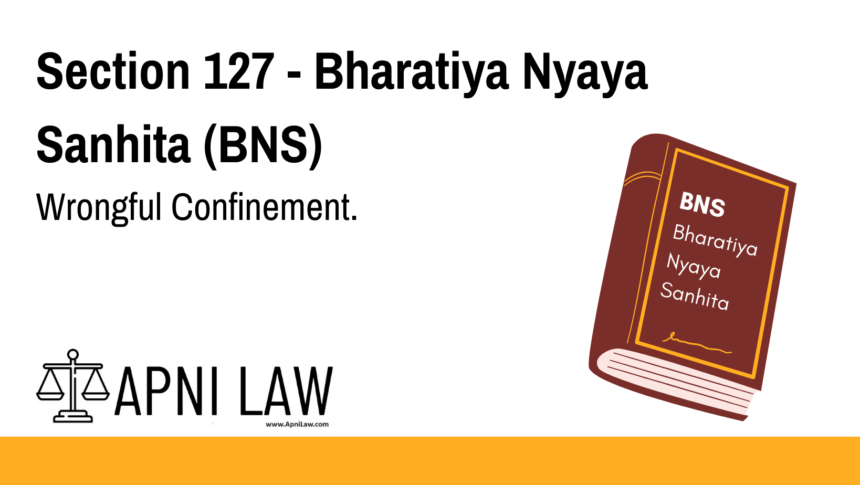Code : Section 127 BNS
(1) Whoever wrongfully restrains any person in such a manner as to prevent that
person from proceedings beyond certain circumscribing limits, is said “wrongfully to confine”
that person.
Illustrations.
(a) A causes Z to go within a walled space, and locks Z in. Z is thus prevented from
proceeding in any direction beyond the circumscribing line of wall. A wrongfully confines Z.
(b) A places men with firearms at the outlets of a building, and tells Z that they will fire
at Z if Z attempts to leave the building. A wrongfully confines Z.
(2) Whoever wrongfully confines any person shall be punished with imprisonment of
either description for a term which may extend to one year, or with fine which may extend to
five thousand rupees, or with both.
(3) Whoever wrongfully confines any person for three days, or more, shall be punished
with imprisonment of either description for a term which may extend to three years, or with
fine which may extend to ten thousand rupees, or with both.
(4) Whoever wrongfully confines any person for ten days or more, shall be punished
with imprisonment of either description for a term which may extend to five years, and shall
also be liable to fine which shall not be less than ten thousand rupees.
(5) Whoever keeps any person in wrongful confinement, knowing that a writ for the
liberation of that person has been duly issued, shall be punished with imprisonment of either
description for a term which may extend to two years in addition to any term of imprisonment
to which he may be liable under any other section of this Chapter and shall also be liable to
fine.
(6) Whoever wrongfully confines any person in such manner as to indicate an intention
that the confinement of such person may not be known to any person interested in the
person so confined, or to any public servant, or that the place of such confinement may not
be known to or discovered by any such person or public servant as hereinbefore mentioned,
shall be punished with imprisonment of either description for a term which may extend to
three years in addition to any other punishment to which he may be liable for such wrongful
confinement and shall also be liable to fine.
(7) Whoever wrongfully confines any person for the purpose of extorting from the
person confined, or from any person interested in the person confined, any property or
valuable security or of constraining the person confined or any person interested in such
person to do anything illegal or to give any information which may facilitate the commission
of an offence, shall be punished with imprisonment of either description for a term which may
extend to three years, and shall also be liable to fine.
(8) Whoever wrongfully confines any person for the purpose of extorting from the
person confined or any person interested in the person confined any confession or any
information which may lead to the detection of an offence or misconduct, or for the purpose
of constraining the person confined or any person interested in the person confined to
restore or to cause the restoration of any property or valuable security or to satisfy any claim
or demand, or to give information which may lead to the restoration of any property or
valuable security, shall be punished with imprisonment of either description for a term which
may extend to three years, and shall also be liable to fine.
Explanation of Section 127 BNS
Section 127 of Bharatiya Nyaya Sanhita (BNS) deals with wrongful confinement, which is a more severe form of wrongful restraint (Section 126 BNS). It involves completely restricting a person’s movement within circumscribing limits, meaning they cannot escape in any direction.
Key Elements of Wrongful Confinement
- Complete Restriction: Unlike wrongful restraint (which restricts movement in one direction), wrongful confinement prevents movement in all directions.
- Unlawful Detention: The person confined must not be legally required to stay in that place.
- Use of Force or Threats: The confinement can be achieved through physical force, threats, or deception.
- Duration of Confinement Matters: The longer the confinement, the harsher the punishment.
Illustrations of Wrongful Confinement
Example 1: Locking Someone in a Room
A locks B inside a house and does not allow B to leave. This is wrongful confinement under Section 127 BNS.
Example 2: Holding a Worker Against Their Will
A factory owner confines a worker in a room for more than 10 days over unpaid wages. This results in a punishment of up to 5 years and a fine of at least ₹10,000.
Example 3: Illegal Detention by Private Security
A security guard wrongfully detains a person in a mall’s basement, claiming they are a suspect. This is wrongful confinement and is punishable under this section.
Example 4: Police Misusing Authority
A police officer detains a person without legal justification, keeping them in a hidden location to force a confession. This is wrongful confinement for extortion and carries up to 3 years of imprisonment.
Difference Between Wrongful Restraint and Wrongful Confinement
| Feature | Wrongful Restraint (Section 126 BNS) | Wrongful Confinement (Section 127 BNS) |
|---|---|---|
| Definition | Blocking a person’s movement in one direction. | Preventing a person from moving in any direction. |
| Example | A stops B from entering a park. | A locks B inside a house. |
| Punishment | Up to 1 month imprisonment or ₹5,000 fine. | Up to 5 years imprisonment + ₹10,000 fine (depending on duration). |
| Severity | Less serious. | More serious. |
Common Questions on Section 127 BNS
1. What is the punishment for wrongful confinement?
The punishment depends on the duration of confinement:
- Up to 1 year for basic confinement.
- Up to 3 years if the confinement lasts 3 days or more.
- Up to 5 years if the confinement lasts 10 days or more.
2. Is wrongful confinement a serious offense?
Yes. It is cognizable (police can arrest without warrant) and can lead to severe imprisonment if the confinement is prolonged or done secretly.
3. Can police officers be charged under Section 127 BNS?
Yes. If a police officer wrongfully confines a person without legal justification or hides their location, they can be prosecuted under this section.
4. What if a person is confined but not physically locked up?
Even if a person is threatened or tricked into staying in a confined area, it still qualifies as wrongful confinement under Section 127 BNS.
5. What is the difference between kidnapping and wrongful confinement?
- Kidnapping (Section 104-105 BNS): Involves taking a person from one place to another.
- Wrongful Confinement (Section 127 BNS): Involves restricting a person’s movement within a certain place.
Conclusion
Section 127 of the Bharatiya Nyaya Sanhita (BNS) protects individuals from illegal confinement by private individuals, security personnel, or even police officers. It ensures freedom of movement and provides strict penalties for prolonged or secretive confinement.
For more legal insights, visit ApniLaw today! 🚀








